|
|
|
Sort Order |
|
|
|
Items / Page
|
|
|
|
|
|
|
| Srl | Item |
| 1 |
ID:
137731
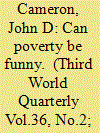

|
|
|
|
|
| Summary/Abstract |
This article examines the use of humour as a strategy to promote increased public engagement in the countries of the global North with issues of global justice. The central argument of the article is that humour can be both an ethical and an effective way of attracting and sustaining public engagement in struggles for global justice. There are risks and limits to the use of humour to represent issues of poverty and injustice but, given low levels of public engagement in these issues in the countries of the global North, humour is a risk worth taking.
|
|
|
|
|
|
|
|
|
|
|
|
|
|
|
|
| 2 |
ID:
126561


|
|
|
|
|
| Publication |
2013.
|
| Summary/Abstract |
This paper presents an analysis of public preferences for a low carbon future UK and compares them with three future scenarios proposed by the UK government based on data from 10,983 self-selected participants who engaged in the UK Department of Energy and Climate Change 'My2050' online simulation. Participants expressed a stronger preference for demand-side options than for supply-side ones. They also chose fuel switching (to electricity) and technical energy efficiency measures above more behaviour focused options. Renewable energy options (wind, solar, marine and hydro) were preferred to other low carbon supply options (nuclear power, carbon capture and storage), with offshore wind power more popular than onshore. Nuclear power was the least popular generation option. Acceptability of the government's three proposed scenarios was tested by comparing these scenarios with the research findings. Greatest support was suggested for the two scenarios emphasising business greenness, home energy efficiency, electrification of home heating and travel behaviour. The lowest level of support was demonstrated for the scenario based on significant growth in nuclear power with minimal increases in energy efficiency. Despite issues regarding the representivity of the sampled respondents, the work demonstrates the possibility of using outputs from the tool to assess publically preferred pathways.
|
|
|
|
|
|
|
|
|
|
|
|
|
|
|
|
| 3 |
ID:
144840
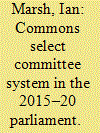

|
|
|
|
|
| Summary/Abstract |
The House of Commons select committees witnessed some of the most constructive political theatre of the 2010-2015 Parliament. Recall Rupert Murdoch's public contrition, Margaret Hodge's assault on MNC tax evasion and Keith Vaz's timely interrogations of G4S, etc. The committees also embraced social media and adopted public engagement as a key task. These developments all reflect a newly emboldened system. In recent months, four reports have been published which reflect on these developments. They also look forward to the further substantial development of committee activity. The system thus sets sail with an abundance of specific suggestions, including ideas that could have far wider and more far-reaching democratic implications.
|
|
|
|
|
|
|
|
|
|
|
|
|
|
|
|
| 4 |
ID:
096077


|
|
|
|
|
| Publication |
2010.
|
| Summary/Abstract |
The aim is to observe how hydrogen, in its wider meaning as a 'system innovation', is understood by a cross section of the general public in three regions of the UK that have embryonic developments: Teesside, South West Wales and London.
Focus groups were conducted in two separate phases: the first, involving nine groups, took place between June 2005 and March 2006; the second, involving seven groups, took place in the period October-November 2006, mainly with groups reconvened after the first phase. They presented to participants 'user-friendly' information about possible scenarios for a hydrogen economy, and helped the group to identify criteria that might be most salient for decision-makers.
Public awareness of hydrogen in the three case study areas, both in general and in relation to local demonstration projects, proved minimal, with the exception of the few who had direct experience of the chemical industry (in Teesside and South West Wales).
When engaged in an informed debate about hydrogen and its future possible developments, participants were willing to learn about the different options and expected to be fully informed on how these would impact on their everyday lives as consumers and citizens. Risk perception is important, but not the only factor in lay understanding of hydrogen. More relevant is the extent to which the different configurations of hydrogen systems align with the public's 'view of the world' (social and environmental values, needs and expectations) and how participants think hydrogen energy would be embedded in their daily routines. There is a lack of trust in political authorities, business and industry, and within and across different social groups; ambivalence in how trust is placed on information providers, role models and opinion formers; and public unease in dealing with, and making sense of, conflicting information coming from 'expert' sources.
The evidence is useful to inform policy, both on national and local level. It is especially useful in addressing public engagement as a political strategy.
|
|
|
|
|
|
|
|
|
|
|
|
|
|
|
|
| 5 |
ID:
128012


|
|
|
|
|
| Publication |
2014.
|
| Summary/Abstract |
This paper presents the results of a large group process conducted in Edinburgh, Scotland investigating public perceptions of climate change and low-carbon energy technologies, specifically carbon dioxide capture and storage (CCS). The quantitative and qualitative results reported show that the participants were broadly supportive of efforts to reduce carbon dioxide emissions, and that there is an expressed preference for renewable energy technologies to be employed to achieve this. CCS was considered in detail during the research due to its climate mitigation potential; results show that the workshop participants were cautious about its deployment. The paper discusses a number of interrelated factors which appear to influence perceptions of CCS; factors such as the perceived costs and benefits of the technology, and people's personal values and trust in others all impacted upon participants' attitudes towards the technology. The paper thus argues for the need to provide the public with broad-based, balanced and trustworthy information when discussing CCS, and to take seriously the full range of factors that influence public perceptions of low-carbon technologies.
|
|
|
|
|
|
|
|
|
|
|
|
|
|
|
|
| 6 |
ID:
162909
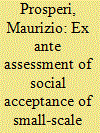

|
|
|
|
|
| Summary/Abstract |
Social acceptance is a relevant determinant of the development of agro-energy systems because its absence can cause delays or even the abandonment of innovative projects. This paper aims at an ex ante assessment of the socio-political acceptance of small-scale agro-energy systems in rural areas located in southern Italy, according to the bioenergy village approach. Starting from a theoretical model, we investigated the key factors influencing the perception of the risks and benefits of the realization of a biomass combustion plant, by a statistical survey on a sample of 152 members of the local community living in eight municipalities located in a rural area. Through exploratory and confirmatory statistical analyses, we identified two key factors: (a) the economic, environmental, and social benefits for the community and (b) reassurance from the energy company management. This research shows that it is very important to consider these elements in order to facilitate dialogue and the debate within the local community. In this way, the involved actors will be enabled to express their expectations to decision makers and policymakers, thus contributing to the steering of the project. In other words, community involvement and the democracy of the energy policy processes are favoured.
|
|
|
|
|
|
|
|
|
|
|
|
|
|
|
|
| 7 |
ID:
137733


|
|
|
|
|
| Summary/Abstract |
In recent years events that physically challenge Northern publics have emerged as a new form of engagement with global poverty. In this article we examine the ‘Live Below the Line’ (LBTL) campaign, which asks participants to live on a small amount of money equivalent to the international poverty line for five days, as an example of experiential exercises that complement physical challenges with the simulation of some aspect of poor people’s lives. Drawing on interviews with participants in the 2013 New Zealand campaign, we argue that LBTL creates a limited understanding of poverty focused on poor food consumption caused by low income. While participants were able to have a more embodied and empathetic engagement with poverty, they projected their own physical and emotional sensations onto imagined poor others. As a result, stereotypes about those living in poverty were reinforced rather than challenged.
|
|
|
|
|
|
|
|
|
|
|
|
|
|
|
|
| 8 |
ID:
138224


|
|
|
|
|
| Summary/Abstract |
Public engagement (PE) initiatives can lead to a long term public support of science. However most of the real impact of PE initiatives within the context of long-term science policy is not completely understood. An examination of the National Aeronautics and Space Administration's (NASA) and European Space Agency's (ESA) Hubble Space Telescope, James Webb Space Telescope, and NASA's International Sun/Earth Explorer 3 reveal how large grassroots movements led by citizen scientists and space aficionados can have profound effects on public policy. We explore the role and relevance of public grassroots movements in the policy of space astronomy initiatives, present some recent cases which illustrate policy decisions involving broader interest groups, and consider new avenues of PE including crowdfunding and crowdsourcing.
|
|
|
|
|
|
|
|
|
|
|
|
|
|
|
|
| 9 |
ID:
095951
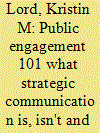

|
|
|
| 10 |
ID:
163542
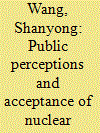

|
|
|
|
|
| Summary/Abstract |
Nuclear energy has been regarded as a controversial energy option to reduce carbon emissions, alleviate global warming and transition to a low-carbon society. Understanding public perceptions and acceptance of nuclear energy and identifying the determinants of acceptance are vital to make nuclear energy policy and establish nuclear energy program. Based on a questionnaire survey conducted in China (N = 719), this study aims to examine public perceptions and acceptance of nuclear energy, and explore the effects of public knowledge about nuclear energy, perceived benefit, perceived risk and public engagement on public acceptance. This study indicated that public knowledge is positively and significantly related to perceived benefit and public acceptance, but not significantly related to perceived risk. Perceived benefit and perceived risk are all positively and significantly associated with public acceptance. Meanwhile, this study also demonstrated the positive effect of public engagement on public acceptance. In addition, this study also revealed that public knowledge, perceived benefit and public engagement in China are at a lower level, and public acceptance of nuclear energy is at a moderate level. However, the level of perceived risk is higher. Based on the results, implications and suggestions are presented.
|
|
|
|
|
|
|
|
|
|
|
|
|
|
|
|
| 11 |
ID:
163604


|
|
|
|
|
| Summary/Abstract |
Media reports have recently indicated that Israel and Saudi Arabia have been cooperating behind the scenes against their common enemies, Iran and jihadist groups. This article sets to explore the rationale behind and essence of this cooperation, while putting it in proper historical perspective. The article shows that Saudi policy toward Israel was consistently dictated by pragmatism rather than ideology, while Israel’s suspicions toward the kingdom disappeared only following the 2006 Lebanon War and the Arab Spring.
|
|
|
|
|
|
|
|
|
|
|
|
|
|
|
|
| 12 |
ID:
132663
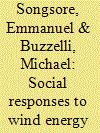

|
|
|
|
|
| Publication |
2014.
|
| Summary/Abstract |
This study documents and analyzes the role of health risk perceptions and other associated concerns of wind energy development (henceforth WED) in Ontario. Drawing on the risk society framework, we conduct a longitudinal media content analysis to document and analyze perceptions of and responses to WED over a nine year period. Attention is paid to temporal variations in responses relative to Ontario×s Green Energy Act (2009) (henceforth GEA); legislation aimed at the rapid expansion of renewable energy. The study reveals that the most radical forms of resistance to WED on health grounds are driven by perceived injustices in the treatment of potential at-risk citizens and citizens with health concerns. The GEA is fuelling these perceptions of injustices in subtle and nuanced ways, particularly by acting as a major confounder to health risk concerns. Contrary to several existing studies, we problematize the use of financial incentives to foster the development of wind energy. We also provide policy recommendations which include the need for increased public engagement in the WED process, the importance of using third party health and environmental assessments to inform developments as well as the need for post-development strategies to address ongoing community concerns.
|
|
|
|
|
|
|
|
|
|
|
|
|
|
|
|
|
|
|
|
|